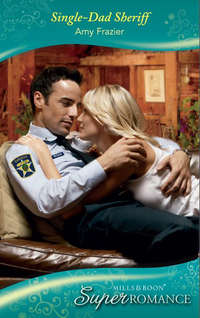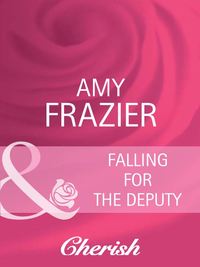
Полная версия
Independence Day

“I want to…park.”
In the moonlight, Chessie sent her husband a sultry look.
“As in…?”
“As in teenage-just-got-the-license park.” She flipped up the armrest, then slid across the front seat to snuggle next to him.
Nick glanced at his watch.
“Not on this date, mister!” she exclaimed, pulling the watch from his wrist and tossing it into the back seat.
“You folks need to move along.” The gruff voice seemed to be right in the car with them.
“What the hell!” Nick raised his hand to shield his eyes from the brightness.
“Nick?” The voice behind the blinding light boomed with amusement. “Chessie? For the love of Mike, you’d think the two of you could take it home.” The police officer lowered his flashlight. It was George Weiss. Their neighbor. “Or at least a hotel room.”
“We were watching the moon rise,” Chessie explained sweetly.
“Among other things,” George added. “I’m going to give you kids my usual safe-sex lecture.” He dug into his pockets. “And these.” He handed Nick a couple packets of condoms.
“Save the lecture, George,” Nick muttered. “We’re heading home.”
“Don’t let me come back in an hour and find you here.” George grinned as if he were really enjoying this. “I’d have to write you up.”
Dear Reader,
Independence Day was probably the most difficult book I’ve written. It’s not about a traditional courtship, the kind that always provides me with such a lovely escape. This is a book that addresses the question “What happens after happily-ever-after?” More often than not, it’s a roller-coaster ride of peaks and valleys. Sometimes the romance fades. Sometimes the passion gets lost in careers and families and pressing responsibility. This could be my life—and writing about issues that cut so close to the bone was very uncomfortable….
But is the rosy glow of courtship retrievable in a marriage? Absolutely, yes! Or so believes my heroine, Chessie McCabe. But for her, it will take a revolution. Little does she know that her quest to rekindle the passion in her workaholic, emotionally AWOL husband, Nick, will throw her family into turmoil and lead to a journey of self-discovery. Chessie and Nick learn that as great as the need for food and shelter is the need to be seen and heard.
Married twenty-nine years, I learned a lot from Chessie.
All my best,
Amy Frazier
P.S. So involved was I with this fictional couple that my daughter began to worry about them, too, calling from college for updates…. So, Sarah, did I guide them safely through the storm?
Independence Day
Amy Frazier

CONTENTS
CHAPTER ONE
CHAPTER TWO
CHAPTER THREE
CHAPTER FOUR
CHAPTER FIVE
CHAPTER SIX
CHAPTER SEVEN
CHAPTER EIGHT
CHAPTER NINE
CHAPTER TEN
CHAPTER ELEVEN
CHAPTER TWELVE
CHAPTER THIRTEEN
CHAPTER FOURTEEN
CHAPTER FIFTEEN
CHAPTER SIXTEEN
EPILOGUE
CHAPTER ONE
“ON STRIKE, I SAID!” Exhilaration racing through her veins, Chessie McCabe threw another armload of dirty laundry from the bedroom window. “I’m on strike until my needs are met!”
Crumpled socks, T-shirts, shorts and underwear surrounding them like some freak snowfall on the summer-green grass below, Chessie’s husband and two teenage daughters gaped up at her. She didn’t blame them. This wasn’t her usual behavior.
Her usual behavior involved patience. Large dollops of nurturing. Calmly maintained family schedules. An abundance of behind-the-scenes hugs, kisses, back rubs, pep talks and emotional support. Not public hysteria.
Well, this might be public, but it wasn’t hysteria. It was a personal Fourth-of-July rebellion. And long overdue.
“Mom!” Fourteen-year-old Gabriella seemed about to die of mortification. “What are we supposed to do with this stuff?”
“I don’t care. Wash it in the harbor. Pound it on the rocks. String it from boat to boat to dry. It’s your dirty laundry. From this day forward, I wash my hands of it.”
Her husband, Nick, eyed her silently. Even from her perspective at the bedroom window, Chessie could see the muscle along his jaw twitch. Not a good sign. And normally one that would send her into peacemaker mode. But not today. Today, the three of them could try to smooth her ruffled feathers.
“Let me make one thing perfectly clear,” she declared, empowered by her second-story podium and the resonant Maine air. “I love the three of you very much. But I’ve spoiled you all rotten. From this day forward, my needs are as important as yours.” She held her fist aloft in a militant salute. “Chessie McCabe is a doormat no more!”
“Mom!” Gabriella jerked her head toward the sidewalk opposite the McCabe cottage. “People…”
Chessie noted with some satisfaction that several obvious out-of-towners, cameras slung round their necks, had stopped on their way to the planned festivities at the village square. Had stopped and begun to stare at the little drama playing out on the front lawn. A small crowd. How handy. Every woman on the verge of rediscovering herself should find an audience.
She grinned. They probably thought this was all part of the town-sanctioned fun, a quaint reenactment of some obscure New England history. Tourists always thought Down-Easters so colorful.
Well, she’d show them colorful.
She plucked Nick’s jockstrap from the bedroom floor behind her. With a whoop of pure abandon, she snapped the strap slingshot style, sending it arcing over her family’s heads to settle on the roof of the purple martin birdhouse in the corner rose garden.
Seventeen-year-old Isabel slouched against the white picket fence around the front yard, embarrassment clouding her sober features.
Nick glanced from the stranded athletic supporter to the smirking tourists to his daughters to his watch. That damned watch. Then, with the same practiced patience he’d use as high-school principal on any one of his recalcitrant students, he stared up at his wife and cleared his throat.
“Chessie,” he said, enunciating carefully. “The parade starts in ten minutes. I have a speech to give in thirty. Could we discuss this later?”
Chessie took a deep breath for courage. Across the street her friend Martha Weiss stood in her doorway, a bemused expression on her face. “Could we discuss this later?” she repeated, returning her gaze to Nick. “I don’t think so. What I want from the three of you is a little bit of now.”
One of the tourists, a middle-aged woman wearing an enormous red hat and a purple jersey tunic, applauded.
Feeling a glorious sense of release, Chessie slammed the window shut. She picked up her empty coffee mug, then headed downstairs to her studio and her potter’s wheel in the barn. Not that she expected to get any work done immediately. Nick and the girls wouldn’t let her opening salvo go unanswered. Oh, no.
Hormonally charged Gabriella wouldn’t lose this opportunity to tell her mother—yet again—how she was absolutely ruining the teenager’s life. While sweet, sensitive and poetic Isabel would take the opportunity to watch life unfold before her, ever the observer, marginally the participant.
And Nick…
Nick. Nick. Nick.
Nick, the proud and virile man Chessie had married eighteen years ago, would inwardly seethe at this inconvenient show of emotion, this lack of family solidarity. Nick, the workaholic and determined provider she’d followed around the country as he’d climbed his way from beginner teacher to full-fledged-high-school-principal-on-the-fast-track-tosuperintendent…this Nick wouldn’t be amused by her rebellion. Her husband, the now restrained and emotionally distant man she loved as a part of herself, but no longer understood, would instantly go into denial.
He’d try to find a way to minimize her outburst, pull his family together in a semblance of greeting-card perfection and still make his speech in the village square with five minutes to spare for schmoozing.
Well, not today. Today spin control wasn’t going to cut it, not when the new and improved Chessie refused to be spun.
In the dining room, Chessie glanced out the window and saw her family in the yard, trotting in line toward the barn. Grim Father Goose and his irate goslings. They knew her well enough to anticipate her destination.
Working her way through the cluttered kitchen, she placed her empty coffee mug precariously on top of the mound of unwashed dishes in the sink and sighed. The dirty dish fairy wasn’t going to do the job this morning. Nope. She’d just wiped scullery duty from her priority list.
Steeling her will toward the revolution, she went out the kitchen door and through the furnace room. Oh, to get her hands in some therapeutic clay. As she opened the door into the barn’s lower level, three stern faces brought her up short.
“What’s all this about?” Nick asked, not without genuine concern.
Chessie moved toward the stairs leading to her studio and classroom. “I’ve chosen today to grant the three of you—and myself—emotional independence.” She brushed past them. “Now, if you’ll excuse me, the creative juices are flowing.”
“But it’s the Fourth of July,” Gabriella whined. “You’ll miss the parade and Daddy’s speech.”
“I’ll open the loft windows.” Their cottage was only one door removed from the village square. “I’ll hear the band and, with the PA system, Daddy’s speech.”
Isabel frowned. “But we won’t be together.”
Pausing, Chessie turned to her older daughter. “As cruel as it sounds, sweetie, we’re none of us joined at the hip. And I need to work.”
“Geez, Dad,” Gabriella groused, “she was sane at breakfast.”
Yes, she had been sane at breakfast.
It was after breakfast she’d needed to take fifteen minutes—fifteen minutes—for herself in her studio to sketch out the plans for the piece that had been buzzing inside her head for days now, the piece that might prove to be a significant advancement in a career that had never fully taken root because the family moved every couple years for Nick’s career.
But noooo…her own fifteen minutes were not to be.
Nick couldn’t find his red suspenders. Gabriella couldn’t find her favorite jean shorts. And Isabel couldn’t find her iPod. All three looked to Chessie to produce the missing items as if by magic. When she’d finally got into the bathroom to wash her face and run a brush through her hair, she’d been met by the avalanche of dirty laundry.
The proverbial straw.
She was expected to be a 24/7 concierge for everyone else, but wasn’t allowed fifteen uninterrupted minutes to be herself. Not someone’s wife. Not someone’s mother. Not someone’s maid. Herself. A concept she’d almost forgotten the meaning of.
She felt her face go red with frustration.
“Mom?” Isabel’s worried voice brought Chessie back to the barn and the present. “Are you all right?”
Nick glanced at his watch. Again with the watch. “Girls, for whatever reason, I think your mom needs some time alone. We can all meet up for the picnic later.” He leaned over and kissed Chessie on the forehead. A very chaste kiss, infuriating in its total lack of passion.
“Do your thing,” he murmured in a tone that bordered dangerously close to patronizing. “Get it all out of your system. Come to the parade later if you can make it. Either way, we’ll have fun this afternoon on the islands.” He delivered his lines with administrative deliberation. “I’m counting on you. As I always do.”
Poor Nick. He didn’t have a clue that the rules had changed this morning.
If his kiss hadn’t been so platonic and his tone so dismissive, Chessie might’ve limited her initial declaration to the shower of dirty laundry. But it seemed her family still needed a more public nudge.
FROM THE PODIUM in front of the flagpole, Nick looked out over the attentive crowd. As he spotted his daughters and the rest of the McCabe clan—his father, Penn, his sister Mariah, and his brothers Jonas, Brad, with Emily and their four children, and Sean, with Kit and Alexandra—he felt very proud. He’d delivered a worthy speech—brief, patriotic and stirring—and he’d delivered it from the heart. Despite Chessie’s unaccountable behavior earlier, he felt a real sense of hometown satisfaction.
“And in closing, I ask each and every one of you,” he concluded with conviction, “as you enjoy today’s activities, to count your blessings. There is no finer, freer place to live than Pritchard’s Neck, Maine.”
As the applause broke out around him, a flash of sunlight on metal captured his attention. Ever the principal, Nick worried that a brass player with the high-school band had gone AWOL for a smoke behind the library—until he saw Chessie in front of the library, adjusting a slapdash sandwich-board sign over her shoulders as she held aloft Nick’s battered junior-high-school trumpet. The sign secure, she put the instrument to her lips and delivered one short, sour blast.
The band leader glowered at his brass section.
Nick’s sense of hometown satisfaction sprang a leak.
It wasn’t at all unusual for Pritchard’s Neck residents and visitors to bring noisemakers to the Fourth of July parade and speech as part of the celebration and the local color. Chessie could toot her horn till the mackerel ran without raising an eyebrow. But the sign gave Nick pause.
In bold capital letters the board read, CHESSIE MCCABE ON STRIKE UNTIL HER NEEDS ARE MET. How many ways could that be taken? And how many people had noticed?
Nick felt the color drain from his face.
He heard a high-pitched, synchronized squeal from the front of the crowd. It appeared Gabriella and Isabel had just spotted their mother.
Damage control his middle name, Nick gave the band leader a curt nod. Quentin Landry, one of Nick’s high-school faculty, responded immediately by having his students play a rousing exit march.
Snapping photos as if in pursuit of a Pulitzer, the tourists who’d witnessed the literal airing of McCabe dirty laundry earlier crowded around a sweetly smiling Chessie. It would be just Nick’s luck if one of them worked for The New York Times Sunday magazine. His wife’s behavior—today’s behavior—certainly fit the eccentric mold outsiders often formed of Mainers, delighted in spreading in travel articles. But Nick—specifically, his career—couldn’t afford eccentricity.
Grinding his teeth, he made his way off the bunting-trimmed podium.
Gabriella and Isabel assailed him. “Dad—”
“I’ll take care of it.” He gave each daughter a quick hug. “You know your mom—always on the cutting edge.”
“But—”
“Go get the picnic hamper. We’ll all four be on our way in just a sec.” He could only hope.
The two girls stared at him.
“I promise,” he said, grimacing.
What had gotten into his wife? Because of her artistic nature, he expected her to be occasionally, creatively quirky. In private. She’d always been sensible in public. Supportive.
Fully intending to keep his private and his public lives separate, Nick pushed through the crowd around the library entrance. “Excuse me,” he said, grasping Chessie’s arm and propelling her through the doorway into the small book drop foyer. “Show’s over, folks.” The sandwich board banged him in the shins.
Closing the outer door with difficulty, he turned to Chessie. Heatstroke might be a reasonable explanation for her bizarre behavior this morning. But she beamed up at him, her hazel eyes clear and purposeful.
“Performance art?” he asked, hopeful.
“Absolutely not,” she replied with a seriousness that short-circuited his brief glimmer of optimism.
“Are you angry with me? With the girls?” Arguing on one of his rare days off wasn’t his idea of fun. He hated confrontation on the home front. He relied on Chessie to negotiate peace.
She cocked her head. “Angry is such a negative word.”
“What then? Pick a word, any word. As long as it explains why you threw our laundry onto the front lawn. Why you’re wearing a…a picket sign.”
“You noticed.” She sighed. Her angelic expression hinted at sarcasm.
“Of course I noticed.”
She patted his arm. “That’s a start.”
“A start?” In exasperation, he rubbed his hand across his forehead. “I have one day to relax before summer school begins. The driver’s ed car’s in the shop. The state accreditation team’s making its first visit in two days. The air-conditioning in the science lab has been acting hinky. My best English teacher just told me she’s pregnant and won’t be back for the fall term…” He took a deep breath. “I wanted one day—one day—to recoup with my family.”
“I needed fifteen minutes to work on an idea,” she said, her voice barely above a whisper.
“An idea for a pot?”
“Sort of.”
“And we didn’t give it to you.”
“That’s what I thought at first. But then I realized you three wouldn’t give it if I didn’t take it. Couldn’t take advantage of me if I didn’t let you.”
As he tried to digest this, she flashed him a grin. Her megawatt smiles never ceased to take his breath away, but this one felt like a shot to the solar plexus.
“And now that you’ve asserted yourself…” He hesitated, wary. “And now that we’ve taken notice…we’ll kayak to the islands for a picnic?”
“Not exactly.”
“Honey,” his holiday slipping away, he glanced at his watch “the tide’s only going to give us so much leeway.”
“Ah, yes. Time and tide wait for no man.” Her shoulders drooped slightly. “The high-school principal’s credo.”
“Are you trying to pick a fight? Is your p—”
The librarian poked her head into the foyer. “Is there something I could help you find?”
If only. “No, thank you,” Nick replied. “We’re okay.”
As the librarian made her way back to her desk, Chessie glared at Nick. “No, my period isn’t coming,” she whispered, “if that’s what you were about to suggest. It isn’t always about hormones.”
He backpedaled. “Chessie, give me some credit. Is your…pot you wanted to work on under deadline?”
Nice save. His wrist, the one with the watch on it, twitched.
“Not in the usual sense.” She narrowed her eyes. “I told you a trustee for the Portland Museum of Art loved the idea for this piece. She wants it for her private collection. And she carries such influence in the New England art world that a successful sale might be the opening I’ve been looking for. The opening that could take my career to the next level.”
“I didn’t understand.” A library patron tried to enter the cramped foyer with an armload of books, but the heavy sandwich board Chessie still wore got in the way.
“Sorry.” Awkwardly, Nick and Chessie squeezed farther back into the corner.
“I know you didn’t understand,” Chessie continued, lowering her voice even more. “Neither did the girls. That’s just the point. But you will.”
Nick felt queasy. He liked explanations. Concise and logical explanations stripped of a storyteller’s suspenseful pacing. He didn’t like surprises. Pinching the bridge of his nose, he said, “Give me a hint.”
“Let’s just say I’m having my midlife crisis. I’ve worked hard for it. I deserve it. And I’m going to enjoy it.”
“Chessie. You’re only thirty-seven.”
“And getting older by the minute.” She reached for the door. “Go on. Take the girls to the islands. I’ll spend the afternoon in my studio. We’ll watch the fireworks together from the terrace tonight.”
He stayed her hand on the knob. “You’re kidding about the midlife crisis.”
She paused. “If that explanation gets you thinking about the lopsided dynamics of our family life, so be it.”
“What lopsided dynamics?”
“Hadn’t noticed, had you?” Chessie bristled, an unusually combative look in her eyes. “How about my unappreciated backstage roles as the family’s chief cook and bottle washer, laundress, taxi driver, mediator, cheerleader, nurse, convenient lover and general bend-over-till-I-can-touch-my-nose-to-my-behind Gumby?”
“You can’t possibly think of yourself that way.”
“I don’t, but the rest of you—”
“Shh!” A child in the picture-book section put her finger to her lips.
With effort, Nick closed the door between the foyer and the main reading room. “What’s gotten into you?” He wasn’t a stupid person. He was the principal of a regional high school.
She paused, leveling him with her gray-green stare. “I have work. Work I need to do for myself. For a change. It’s not as if I’m abandoning you. I don’t always have to be the recreation director. It will do the three of you good to spend some time alone together. To have your routine jostled a bit.”
His work routine was always being jostled. He didn’t like upset in his personal life.
“We’ll talk later,” she offered. “There’ll be a quiz on what you’ve learned this morning.”
He didn’t react to her attempt at humor. “I’ll carry the sign home for you.” He needed to take charge, even in this small way.
“Nick, Nick,” she purred, “you always were my knight in shining armor.”
“Were?” He stiffened. “So what am I now?”
“Your armor needs a little buffing.” She wriggled out of the sandwich board.
Confused, Nick took the bulky sign from her and, with difficulty, turned it inside-out so the words were hidden. He opened the door as if nothing had happened.
But something had.
When they’d married eighteen years ago, they’d been in total agreement. He’d be the breadwinner. She’d keep home and hearth. Now Chessie wanted to change the agreement. It made Nick, a man who never tinkered with what worked, want to reach for the antacid tablets.
Chessie knew that, after her demonstration, Nick would want to make it home without attracting any more attention. But the sight of Penn, along with Sean, Kit and Alex waiting for them outside the library told her escape would be impossible. McCabes—even in small groups—were notorious for practicing family by committee.
“So, this is what you had in mind when you said you had other plans and couldn’t come to the family picnic,” his father said.
Chessie saw Nick flinch. “I was going to take my family to the islands,” he replied, a defensive edge to his voice. “I never have time to get out on the water. It seems I rarely have time to see my wife and daughters.”
“Is that what Chessie’s demanding?” With an amused twinkle in his eye, Penn indicated the now reversed sandwich board. “More attention?”
“Pop, butt out.” Good-naturedly, Sean nudged their father.
“Hey, I’m just wondering if I should be wearing a protest sign,” Penn retorted. “I’m his old man, and I never see him.”
“I’m busy, Pop. Making a living.”
“We all are,” Sean noted. “So…great speech.”
“Aunt Chessie, can I play your trumpet?” Sean’s nine-year-old daughter Alex piped up. Nick looked relieved to be out of the spotlight for a moment.
“Sure.” Chessie relinquished her noisemaker. “Do you think you can play it better than I did?”
“You weren’t very good,” Alex said with her typical candor. She put the trumpet to her lips, then blew till she was red in the face. Only a hiss of air came out. With a frown she lowered the instrument. “But you’re better than me.”
The adults laughed.
“Take it home with you,” Nick urged. “You can practice.”
“Oh, thanks.” Sean ruffled Alex’s hair. “Just what we need. More noise in the house.”
“Your Uncle Nick’s afraid Aunt Chessie might try to make a point with it again,” Penn declared dryly.
“So…” Kit indicated both the trumpet and the sandwich board. “Are we talking about this?”








